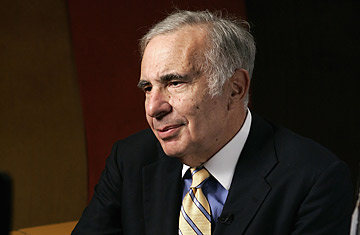
Financier Carl Icahn
(2 of 2)
Although many names have rallied from their trough in March 2009, they're still far short of their highs. Las Vegas Sands (LVS) was trading at more than $138 a share in October 2007 and plunged to under $2 a share in March 2009. Although it has since risen 10-fold to $20 a share, it's still far below its peak. Wynn Resorts (WYNN) and Las Vegas Sands have seen the biggest gains, with their stocks rising 296% and 842% respectively in the past 52 weeks. But their gains were driven largely by their exposure to the lucrative Macau market, where gaming has been on fire. Indeed, gaming revenue totaled $15 billion in Macau in 2009, which is three times Las Vegas' $5 billion, according to Brashear, and both Wynn and LVS relied on Macau for more than 60% of their earnings in 2009. "The expansion in Asia has been unbelievable," says Brashear. "There's 2.5 billion people within a five-hour flight of Macau, and that's nearly 40% of the world's population."
But U.S. gaming stocks don't reflect any recovery in the U.S. market — at least not yet. This means stocks with big exposure to the U.S. gaming market could be poised to rally. How much and how fast this happens will depend on the speed and scope of the economic rebound.
Companies with big holdings in Sin City will likely see an earlier and faster rally than those that focus on regional markets, analysts say. There have already been signs of improvement in Las Vegas, where traffic has increased in the past four months, although gaming revenue remains flat, says Bill Lerner, chief executive of research group Union Gaming Group. Also, some companies like MGM Mirage (MGM) who were buried under a mountain of debt and teetering on bankruptcy a year ago have managed to restructure their debt issues and are no longer on analysts' bankruptcy watch lists.
"If you look out two or three years with the expectation that the industry will return to its historic growth pattern, the upside [potential] is enormous," says Barrow.
But experts are more bearish on Atlantic City and other regional markets. Atlantic City is facing stiff competition from a flurry of neighboring states, such as Pennsylvania, Delaware, West Virginia and Maryland, that have been expanding their gaming operations beyond slot machines to include table games. At the same time, other states, such as Massachusetts and Rhode Island, are expected to legalize gambling to fill budget shortfalls.
Also, the average age of Atlantic City's casinos is 26 years, making it difficult for the outdated gambling houses to compete with newly built ones in nearby states, says Chris Snow, a CFA and senior analyst at CreditSights, an independent credit-research firm.
Las Vegas won't be affected by the regional casinos, as much of Sin City's traffic comes from conventions and vacation goers and its properties are state-of-the-art megaprojects of a sort that can't be found in other parts of the country, says Snow.
Brashear believes MGM would see the biggest rally from a Las Vegas recovery, with Wynn and Las Vegas Sands also reaping benefits.
As for Icahn, this isn't his first foray into the casino sector. Between 2000 and 2006, he purchased four casinos — the Stratosphere, Arizona's Charlie's Boulder, Arizona Charlie's Decatur and Aquarius Casinos — for $300 million, and sold them for $1.2 billion in 2008 before the recession unleashed the worst of its fury. (The original price was $1.3 billion, but was adjusted down slightly at closing time.) "That's a pretty good reward for waiting, right?" says Icahn. "Hopefully history will repeat itself."
